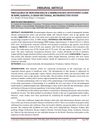A Review of the Most Common Dermatologic Conditions and Their Debilitating Psychosocial Impacts
July 2019
in “
International archives of internal medicine
”

TLDR Common skin conditions can greatly affect a person's mental health and social life.
In 2019, a review was conducted on the psychological and emotional impacts of common dermatologic conditions, including acne, atopic dermatitis, alopecia, hirsutism, hyperhidrosis, hidradenitis suppurativa, vitiligo, psoriasis, skin cancer, and sexually transmitted infections (STIs) like Human papilloma virus (HPV) and herpes simplex virus (HSV). These conditions, while not life-threatening, were found to significantly affect a patient's quality of life. For instance, acne was associated with lower social attachments and decreased work productivity, while alopecia had profound effects on self-esteem and body image. The review also highlighted the high level of stigma associated with STIs, which can lead to significant psychological distress. The document concluded that physicians must acknowledge the profound negative psychosocial impacts of these conditions and treat patients not only according to the clinical severity of their disease, but also the effect on their psychological well-being.




